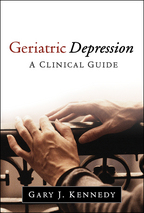Geriatric Depression
A Clinical Guide
Gary J. Kennedy
Hardcovere-bookprint + e-book
Hardcover
orderMarch 10, 2015
ISBN 9781462519866
Price: $43.00 234 Pages
Size: 6" x 9"
Written for a broad range of mental health professionals, this book explains why depression can be challenging to treat in older adults and describes the most effective interventions. Noted geriatric psychiatrist Gary J. Kennedy draws on extensive clinical experience and research to present current best practices in pharmacotherapy, psychotherapy, other psychosocial and lifestyle interventions, and electroconvulsive therapy. Depressive disorders complicated by psychosis, mania, dementia, and bereavement are addressed in detail, as is suicide prevention. Kennedy emphasizes the importance of integrating care across service settings and building strong partnerships with patients and their families. Quick-reference tables throughout the book distill critical elements of intervention.
See also the author's award-winning Geriatric Mental Health Care: A Treatment Guide for Health Professionals, which provides a framework for treating the most frequently encountered psychiatric problems in this population.
See also the author's award-winning Geriatric Mental Health Care: A Treatment Guide for Health Professionals, which provides a framework for treating the most frequently encountered psychiatric problems in this population.
“The target audience is mental health professionals involved in the diagnosis and treatment of patients with late-life depression, but primary care physicians also would benefit. Written by a nationally recognized expert in geriatric psychiatry, it is a welcome addition to the psychiatric literature….This is an outstanding book, written by an expert in geriatric psychiatry. Any clinician who treats older adults needs to be familiar with the material in this superb book. It should be required reading for all psychiatrists and geriatricians.”
—Doody's Review Service
“I am pleased that this critically needed book on a very much neglected topic in health care has become available. Kennedy’s approach is thoughtful, logical, and well organized. He addresses all aspects of geriatric depression, from the basic difficulties of defining depression in the elderly population to the problems of effective treatment. Having all of this information in a single, clearly laid-out volume is invaluable for clinicians and instructors. I found the chapter on diet and exercise to be especially exciting and useful. I plan to use this book in teaching my residents and geriatric fellows. Its strength lies in its comprehensive perspective, making it a welcome addition to the geriatrician's library.”
—Donald A. Davidoff, PhD, Department of Psychiatry, Harvard Medical School; Chief, Department of Neuropsychology, McLean Hospital
“Kennedy is one of our most astute and pragmatic geriatric psychiatrists. In this book, he explains how to recognize depressive symptoms in older adults, including those with chronic physical illness. He discusses effective intervention strategies and applications for diverse settings and providers. Health care practitioners and administrators will gain practical, important insights into both the science and the art of providing optimal care to this undertreated population.”
—Rosanne M. Leipzig, MD, PhD, Gerald and May Ellen Ritter Professor, Brookdale Department of Geriatrics and Palliative Medicine, Icahn School of Medicine at Mount Sinai
“Geriatric Depression provides an up-to-date and well-researched discussion of this important topic, in the context of the rapidly evolving health care scene and with reference to DSM-5. Kennedy emphasizes a team approach that includes psychiatrists, psychologists, social workers, primary care providers, and nurses. The practical evaluation tools and decision trees will appeal to practitioners.”
—Judy M. Zarit, PhD, private practice, State College, Pennsylvania
“Kennedy has used his long experience as a clinician, investigator, and teacher to produce a book that that is both intellectually stimulating and practical. He has a unique ability to clarify complex concepts related to biological interactions, comorbidity, and psychosocial context, and to arrive at a synthesis that informs evidence-based clinical practice. I expect this book to guide the understanding and care of geriatric depression for many years.”
—George S. Alexopoulos, MD, Founder and Director, Weill Cornell Institute of Geriatric Psychiatry
“A timely and practical resource written by an experienced geriatric psychiatrist who has been involved in teaching and training for several decades. This book is appropriate for any mental health provider working with older adults suffering from depression. I also recommend it as a text in geriatric mental health courses. Kennedy helps practitioners and graduate students increase their knowledge and skills related to etiology, pharmacotherapy, suicide risk, evidence-based psychotherapies and other psychosocial interventions, and collaborative care models for treating depression in older adults.”
—Zvi D. Gellis, PhD, Professor and Director, Center for Mental Health and Aging, School of Social Policy and Practice, University of Pennsylvania
Table of Contents
1. The Problem of Depression in Late Life2. What Causes Depression in Late Life and What Makes It Difficult to Treat?
3. Pharmacotherapy
4. Effective Psychotherapies
5. Other Psychosocial Interventions
6. Diet, Supplements, and Exercise
7. Electroconvulsive Therapy
8. Reducing the Risk of Suicide in Late Life
9. Prevention of Depression: Implications for Collaborative Care
Epilogue
References
Index
